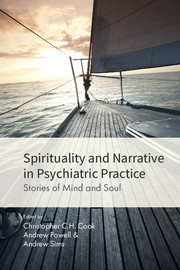Book contents
- Frontmatter
- Contents
- List of contributors
- Foreword
- Preface
- 1 Narrative in psychiatry, theology and spirituality
- 2 Spirituality and transcultural narratives
- 3 Psychopathology and the clinical story
- 4 Helping patients tell their story: narratives of body, mind and soul
- 5 Gods lost and found: spiritual coping in clinical practice
- 6 Stories of joy and sorrow: spirituality and affective disorder
- 7 Stories of fear: spirituality and anxiety disorders
- 8 Stories of transgression: narrative therapy with offenders
- 9 Narratives of transformation in psychosis
- 10 My story: a spiritual narrative
- 11 God's story revealed in the human story
- 12 Meaning without ‘believing’: attachment theory, mentalisation and the spiritual dimension of analytical psychotherapy
- 13 Stories of living with loss: spirituality and ageing
- 14 Beginnings and endings
- Index
8 - Stories of transgression: narrative therapy with offenders
Published online by Cambridge University Press: 02 January 2018
- Frontmatter
- Contents
- List of contributors
- Foreword
- Preface
- 1 Narrative in psychiatry, theology and spirituality
- 2 Spirituality and transcultural narratives
- 3 Psychopathology and the clinical story
- 4 Helping patients tell their story: narratives of body, mind and soul
- 5 Gods lost and found: spiritual coping in clinical practice
- 6 Stories of joy and sorrow: spirituality and affective disorder
- 7 Stories of fear: spirituality and anxiety disorders
- 8 Stories of transgression: narrative therapy with offenders
- 9 Narratives of transformation in psychosis
- 10 My story: a spiritual narrative
- 11 God's story revealed in the human story
- 12 Meaning without ‘believing’: attachment theory, mentalisation and the spiritual dimension of analytical psychotherapy
- 13 Stories of living with loss: spirituality and ageing
- 14 Beginnings and endings
- Index
Summary
‘Nobody interrupts when the murderers talk’ (Celan, 1997: p. 18).
In this chapter, I want to describe those psychological therapies that are called index offence work, that is therapeutic interventions of a psychological nature that explore the experience of causing deliberate harm to others. My experience is based on running therapy groups for men who have killed at a time when they (the perpetrators) were deemed to be mentally ill. I have also drawn on the experience of individual work with perpetrators of homicide and child abuse, especially mothers who have harmed their children.
This book has two explicit foci: the value of a narrative approach to therapeutic work and the relationship of narrative to a spiritual perspective. As previously discussed in this book, the definition of the term ‘spiritual’ leads to complex debates without a single ‘sound-bite’ answer. I, for one, am content that there is no single answer since it seems clear that the domain of ‘the spiritual’ encompasses a range of complex human matters that include consideration of non-material values and non-physical realities, accounts of faith and commitment, not only belief in but also belief that, as well as all the processes and practices by which we can deepen our conscious awareness of ourselves and others and come to know ourselves (Rowson, 2013). What I perceive the narrative and the spiritual to have in common is an inquiring stance that assumes that humans want to make meaning of their actions and lives, if they can; and I assume that stance is also consistent with most forms of psychotherapeutic enquiry.
I describe an approach to therapy that utilises traditional techniques (cognitive, dynamic, group) and newer metacognitive techniques such as mentalisation-based therapy (Bateman & Fonagy, 2006). In addition, our approach to index offence work draws on research into the linguistic coherence of narratives as an indicator of attachment security (Hesse, 2008). This research suggests that close attention to the language people use in therapy can reveal emotional activity and psychological processing of which the speaker may not be aware.
- Type
- Chapter
- Information
- Spirituality and Narrative in Psychiatric Practice , pp. 94 - 107Publisher: Royal College of PsychiatristsPrint publication year: 2016



